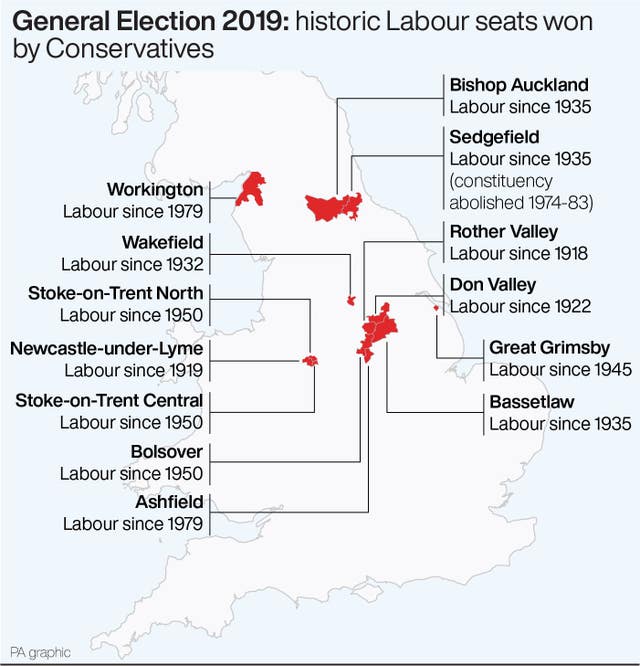
Jeremy Corbyn has indicated he will quit as Labour leader in the early part of next year after the party suffered its worst General Election defeat since 1935.
It came as the 70-year-old came under pressure to stand down immediately.
Speaking about the timetable for him to leave, Mr Corbyn said: “The National Executive will have to meet, of course, in the very near future and it is up to them. It will be in the early part of next year.”
He added: “I have pride in our manifesto that we put forward, and all the policies we put forward, which actually had huge public support.
“But this election was taken over ultimately by Brexit and we as a party represent people who voted both Remain and Leave.
“My whole strategy was to reach out beyond the Brexit divide to try and bring people together, because ultimately the country has to come together.”
READ MORE: Jeremy Corbyn to stand down as Labour leader
Responding to a disastrous night for Labour, which saw a string of its strongholds fall to the Tories, Mr Corbyn said he would not be leading the party into another general election.
But speaking after retaining his Islington North seat, he said he intended to take Labour through a “process of reflection” while it considered the way forward.
“I will discuss with our party to ensure there is a process now of reflection on this result and on the policies that the party will take going forward,” he said.
“And I will lead the party during that period to ensure that discussion takes place and we move on into the future.”
He was rounded on, however, by angry Labour MPs and defeated candidates, who said his leadership was to blame for their catastrophic showing and called on him to go.
READ MORE: Labour swept aside by SNP juggernaut says Richard Leonard
Veteran MP Dame Margaret Hodge, a long-standing critic, said the result represented the rejection of the entire Corbyn project and that it was time for him to quit.
She said that, under his leadership, Labour had become the “nasty party”, with anti-Semitism allowed to flourish.
“People just didn’t trust the economics, the confetti of promises that was thrown at the public without any clear and honest way they were going to be paid for,” she told the BBC.
“People didn’t trust us with the national security of the nation. People didn’t trust Mr Corbyn with looking after them.
“Labour has become the nasty party. I am one of the victims of that with the anti-Semitism.”
READ MORE: Ian Murray: Jeremy Corbyn must quit and Labour must be overhauled
Phil Wilson, who lost Tony Blair’s former seat of Sedgefield to the Tories, said attempts by the leadership to put the result down to Brexit was “mendacious nonsense”.
“Jeremy Corbyn’s leadership was a bigger problem. To say otherwise is delusional. The party’s leadership went down like a lead balloon on the doorstep,” he said.
After losing former Labour stronghold Stoke-on-Trent North, Ruth Smeeth said: “This is a disaster. Jeremy Corbyn should resign now before his own count is in.”
Former cabinet minister Hilary Benn said voters simply did not have confidence in Mr Corbyn’s leadership.
“Any Labour canvasser will tell you we knocked on too many doors where people said ‘I’ve voted Labour all my life but I’m not going to vote Labour on this occasion’, and they didn’t have confidence in the leadership of the party,” he said.
 (PA Graphics)
(PA Graphics)
Allies of the Labour leader insisted the defeat was down to the inability to overcome differences over Brexit rather than a rejection of Mr Corbyn’s radical left-wing policy programme.
The party was left with just 203 seats – down from the 262 it won in the 2017 general election and the 243 it held when Parliament was dissolved in November.


Why are you making commenting on The Herald only available to subscribers?
It should have been a safe space for informed debate, somewhere for readers to discuss issues around the biggest stories of the day, but all too often the below the line comments on most websites have become bogged down by off-topic discussions and abuse.
heraldscotland.com is tackling this problem by allowing only subscribers to comment.
We are doing this to improve the experience for our loyal readers and we believe it will reduce the ability of trolls and troublemakers, who occasionally find their way onto our site, to abuse our journalists and readers. We also hope it will help the comments section fulfil its promise as a part of Scotland's conversation with itself.
We are lucky at The Herald. We are read by an informed, educated readership who can add their knowledge and insights to our stories.
That is invaluable.
We are making the subscriber-only change to support our valued readers, who tell us they don't want the site cluttered up with irrelevant comments, untruths and abuse.
In the past, the journalist’s job was to collect and distribute information to the audience. Technology means that readers can shape a discussion. We look forward to hearing from you on heraldscotland.com
Comments & Moderation
Readers’ comments: You are personally liable for the content of any comments you upload to this website, so please act responsibly. We do not pre-moderate or monitor readers’ comments appearing on our websites, but we do post-moderate in response to complaints we receive or otherwise when a potential problem comes to our attention. You can make a complaint by using the ‘report this post’ link . We may then apply our discretion under the user terms to amend or delete comments.
Post moderation is undertaken full-time 9am-6pm on weekdays, and on a part-time basis outwith those hours.
Read the rules here